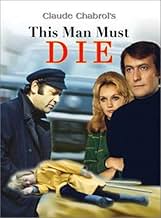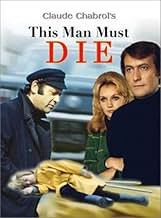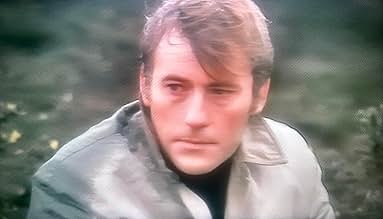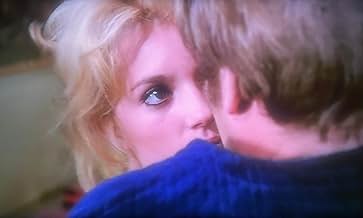IMDb RATING
7.6/10
5.1K
YOUR RATING
A man asserts himself within the life of an actress he believes is somehow responsible for his son's death.A man asserts himself within the life of an actress he believes is somehow responsible for his son's death.A man asserts himself within the life of an actress he believes is somehow responsible for his son's death.
- Director
- Writers
- Stars
- Awards
- 1 win total
- Director
- Writers
- All cast & crew
- Production, box office & more at IMDbPro
Featured reviews
In taking a slight cue from Alfred Hitchcock (one of Chabrol's heroes), but going another step further, This Man Must Die follows a logical turn of events for a single father who's son is run over in a hit and run by some cruel man in a fast car. In Hitchcock's hands this might be led by elegant stars, have even moments of scathing wit. But Chabrol's vision is a little darker, more that is seething under this surface, with the bourgeois as much of the commonplace as just the backdrop for the theater of revenge about to take place. But like the old master, Chabrol takes a twist with the material: as the father, Charles Thenier, going by an alias as a writer of children's books, gets more than acquainted with a woman who is the sister-in-law of the killer, gets to know the family more, and gets to know slimy, shrewd businessman and big-time garage owner Paul Decourt more, he's not really the only one out for his head.
As Chabrol goes further, it becomes a tale of Greek tragedy, or some variation on it. Paul's son, Philippe (a character as played by jean Yanne as if almost out of Bresson), hates his father with a passion, as his father has no respect for or tries to encourage his son with what he's got going on at school (perhaps conventionally, every scene with the father and son is a tense and violent outburst from father towards innocent son). One might think a collaboration might happen between the secretive, diary-writing Charles and the kind but frustrated kid, but this too isn't that simple. Chabrol also takes a smart tactic with that diary of Charles's; it could be just a narrative gimmick, and at times it feels as just that (maybe one of the film's only drawbacks, if only only on), but it does start to probe into a mindset that is one-track, and not without some reason in the genre sense. We're pitted on Charles's side, as he sneaks his way into Helen's heart, and then through her sometimes nice and other times (i.e. Paul's mother) savage in their verbal brutality.
But this same diary works as a something of a step-up from a psychological MacGuffin. Chabrol twists around with plot into motivation, and he pulls it off with his shooting and editing style, which applies just small, precise touches of the good old French New Wave into the proceedings (the occasional jump-cut, as any filmmaker knows, can't hurt under the right circumstances). What Chabrol's brilliant achievement is to transcend the trappings of a revenge film and to explore what the nature of malevolence brings past a simple crime- certainly these bastards have families, if they have the capacity to clear up their crimes with such skill like an owner of a hugely profitable auto-body/garage- and at the same time put a human angle into a plot that requires it. The actors do what they can (the man playing Charles, who I have not seen in other films, is very good in the lead, as is in his own right the man playing Paul Decourt, adding some layers to this rotten being), and despite some clunky scenes that do have to deal with the plot, there's some wit thrown in under the surface ("It's not a needle in a haystack, more like a needle in a box of needles,").
If This Man Must Die isn't a great film, and I'm not sure it is, it is at least a very successful example of finding some of the cracks in a revenge mystery, of adding that superlative mix of character into plot, and seeing what makes things like a diary, or a slip off a cliff, or an ambiguous ending, tick.
As Chabrol goes further, it becomes a tale of Greek tragedy, or some variation on it. Paul's son, Philippe (a character as played by jean Yanne as if almost out of Bresson), hates his father with a passion, as his father has no respect for or tries to encourage his son with what he's got going on at school (perhaps conventionally, every scene with the father and son is a tense and violent outburst from father towards innocent son). One might think a collaboration might happen between the secretive, diary-writing Charles and the kind but frustrated kid, but this too isn't that simple. Chabrol also takes a smart tactic with that diary of Charles's; it could be just a narrative gimmick, and at times it feels as just that (maybe one of the film's only drawbacks, if only only on), but it does start to probe into a mindset that is one-track, and not without some reason in the genre sense. We're pitted on Charles's side, as he sneaks his way into Helen's heart, and then through her sometimes nice and other times (i.e. Paul's mother) savage in their verbal brutality.
But this same diary works as a something of a step-up from a psychological MacGuffin. Chabrol twists around with plot into motivation, and he pulls it off with his shooting and editing style, which applies just small, precise touches of the good old French New Wave into the proceedings (the occasional jump-cut, as any filmmaker knows, can't hurt under the right circumstances). What Chabrol's brilliant achievement is to transcend the trappings of a revenge film and to explore what the nature of malevolence brings past a simple crime- certainly these bastards have families, if they have the capacity to clear up their crimes with such skill like an owner of a hugely profitable auto-body/garage- and at the same time put a human angle into a plot that requires it. The actors do what they can (the man playing Charles, who I have not seen in other films, is very good in the lead, as is in his own right the man playing Paul Decourt, adding some layers to this rotten being), and despite some clunky scenes that do have to deal with the plot, there's some wit thrown in under the surface ("It's not a needle in a haystack, more like a needle in a box of needles,").
If This Man Must Die isn't a great film, and I'm not sure it is, it is at least a very successful example of finding some of the cracks in a revenge mystery, of adding that superlative mix of character into plot, and seeing what makes things like a diary, or a slip off a cliff, or an ambiguous ending, tick.
If there is a Gallic director who likes to surprise his admirers with new tricks,unexpected methods and iconoclastic stance,it is new wave master Claude Chabrol.There have been many bright moments in his illustrious career when he has made films for them which could only be appreciated by a sharp brain and attentive eyes.Que la bête meure is a hard to classify film which is neither a thriller nor a run of the mill revenge drama.It is a film which plays with all leading conventions of these two genres.This man must die starts well with the depiction of a reckless accident.It is quite possible that this might induce inattentive viewers to regard it as a revenge drama.This is not the case as viewers are quickly caught in a maze of crucial dramatic scenes that have direct bearing on film's progress.Caroline Cellier and Michel Duchaussoy perform well as lovers whose relationship has a lot of bearing on this film's progress.Chabrol is known for avoiding a not so happy end for his film.This is the reason why "This man must die" will prepare you to imagine your own type of end in order to do injustice to the concept of happy end of this film.
This is a very fine psychologic thriller in some mellow tones. The story is simple : a boy gets killed by a mad car driver and his father wants to find the man to kill him. We know, from the start, that there can be two finale : the father kills the man, or he changes his mind. But Chabrol makes us think that it can have another finale... Or another? Or perhaps this one? Not at all! We never thought of the real finale. This is brillant, well written and directed movie. Very fine acting by Duchaussoy and Yanne.
"Que la bête meure " belongs to Chabrol's golden era.This is one of his most brilliant achievements,and,nevertheless,he would do even better with the next one"le boucher",with,again,Jean Yanne,an actor,who,before ,was featured in generally mediocre commercial movies.In his two films with Chabrol ,Yanne will show skills we would never thought of.Both characters,in "que la bete..." and "le boucher" are monsters;but monsters of different kinds:in "le boucher",Yanne is pitiful,moving,a product of the war (in Algeria?)On the other hand,in "Que la bête...",he's a hateful vulgar petit bourgeois brute.Compare the way Chabrol introduces his characters:in "le boucher",Popaul appears in the first scene,the wedding banquet,and he seems a good guy.In "Que la bête...",Chabrol does not show his face during Duchaussoy's son death on the road.When finally,the father discovers the reckless driver's house,we meet first his scared family circle.Then we hear his formidable voice.All happens like in a fairy tale:Tom Thumb entering the ogre's den.Perhaps Chabrol's most terrifying character, he holds up to ridicule his wife's attempt at poetry and he cannot understand his son ,a frail,sensitive,and clever teenager. The plot will take shape quickly,and after this story of sound and fury,the last pictures brings the audience some relief.Note,in both films,"le boucher" and "Que la bête.." ,the presence of water in these last pictures.
With 'Que la bete meure' (The English title is 'This Man Must Die' and is inspired by a novel by Cecil Day-Lewis, yes, the father of ... ) Claude Chabrol ends the decade of his consecration as one of the most talented and prolific French film directors of the second half of the 20th century. He had started the 60s as a New Wave theorist and one of the most daring directors of this current and he ends it as a well-known director and one who is very close if not part of the mainstream. Along the way, he made 15 feature films, most of them thrillers, almost all inspired in one way or another by Alfred Hitchcock's films. The master of suspense was not only an idol for the directors of the French New Wave, but he also watched them with interest and he dialogued with them, literally and even artistically. For Chabrol, 'Que la bete meure' marks not only the end of an excellent decade of film directing, but also represents one of his best and most original films.
Most of the story takes place on the Breton shores of the ocean, in the villages and especially on the roads near the cliffs. The film begins with the traumatic intersection of two destinies - a child who returns from picking shells on the ocean shore is killed by a car in a hit-and-run accident. The father, a writer of books for children (Michel Duchaussoy) vowes to dedicate the rest of his life to finding the person responsible for his son's death and murder him. He entrusts his thoughts of revenge to a personal diary that will play a key role in the story. The private investigation, with a little luck, leads the hero to identify the probable culprit quite quickly, but that the revenge plans turn out to be more complicated than expected. As in many of Chabrol's films, we come to know a French bourgeois family in which nothing corresponds to appearances, and in which the hatred of members towards the head of the family comes to resemble the situations in Agatha Christie's detective novels in which almost all characters have good reasons to commit the crime. It is a very well written script, with romantic elements, suspense and social criticism, all under the sign of revenge, and which also has the quality of an ending that does not try to solve everything but lets the viewer to choose his favorite interpretation. By the way, the dialogues are written by Chabrol, but the script is inspired by a book by Cecil Day-Lewis, yes, the father off ...
Michel Duchaussoy and Caroline Cellier do their jobs well in the role of the vengeful father and of the star actress with whom the writer begins a relationship in order to reach her brother-in-law, the main suspect. As often, however, the negative role is the one that proves to be the most interesting and JJean Yanne eclipses the two, although he enjoys less screen time. The cinematography, as always at Chabrol, is excellent. Beyond the tranquility of the landscapes or in the luxury of bourgeois houses, the dramas are hidden and the tension is ready to erupt at any moment. 51 years after the premiere, the world of 'Que la bete meure' seems much simpler, without mobile phones and the Internet, but the effect is that in their absence we get faster to the essence of the feelings and passions of the characters - and here nothing looks old-fashioned. It is one of Chabrol's most carefully designed and best-written films - recommended viewing.
Most of the story takes place on the Breton shores of the ocean, in the villages and especially on the roads near the cliffs. The film begins with the traumatic intersection of two destinies - a child who returns from picking shells on the ocean shore is killed by a car in a hit-and-run accident. The father, a writer of books for children (Michel Duchaussoy) vowes to dedicate the rest of his life to finding the person responsible for his son's death and murder him. He entrusts his thoughts of revenge to a personal diary that will play a key role in the story. The private investigation, with a little luck, leads the hero to identify the probable culprit quite quickly, but that the revenge plans turn out to be more complicated than expected. As in many of Chabrol's films, we come to know a French bourgeois family in which nothing corresponds to appearances, and in which the hatred of members towards the head of the family comes to resemble the situations in Agatha Christie's detective novels in which almost all characters have good reasons to commit the crime. It is a very well written script, with romantic elements, suspense and social criticism, all under the sign of revenge, and which also has the quality of an ending that does not try to solve everything but lets the viewer to choose his favorite interpretation. By the way, the dialogues are written by Chabrol, but the script is inspired by a book by Cecil Day-Lewis, yes, the father off ...
Michel Duchaussoy and Caroline Cellier do their jobs well in the role of the vengeful father and of the star actress with whom the writer begins a relationship in order to reach her brother-in-law, the main suspect. As often, however, the negative role is the one that proves to be the most interesting and JJean Yanne eclipses the two, although he enjoys less screen time. The cinematography, as always at Chabrol, is excellent. Beyond the tranquility of the landscapes or in the luxury of bourgeois houses, the dramas are hidden and the tension is ready to erupt at any moment. 51 years after the premiere, the world of 'Que la bete meure' seems much simpler, without mobile phones and the Internet, but the effect is that in their absence we get faster to the essence of the feelings and passions of the characters - and here nothing looks old-fashioned. It is one of Chabrol's most carefully designed and best-written films - recommended viewing.
Did you know
- TriviaThis film is based on a British novel of the 1930s written by the poet C. Day Lewis (under the pseudonym "Nicholas Blake") and is one of several novels by him to feature as its hero the brilliant amateur sleuth Nigel Strangeways. This adaptation, in addition to moving the action to modern-day France, entirely leaves out this leading character (or any new French character equivalent to him).
- GoofsAt the beginning Paul is shifting several times although the Mustang has an automatic transmission.
- ConnectionsFeatured in Le cinéma passe à table (2005)
- Soundtracks4 ernste Gesänge Op. 121
Music by Johannes Brahms (as Brahms)
Performed by Kathleen Ferrier (as Katleen Ferrier)
Disque DECCA ACL 306
- How long is This Man Must Die?Powered by Alexa
Details
- Release date
- Countries of origin
- Language
- Also known as
- Neka zvijer krepa
- Filming locations
- Argol, Finistère, France(Exterior)
- Production companies
- See more company credits at IMDbPro
- Runtime1 hour 50 minutes
- Sound mix
- Aspect ratio
- 1.66 : 1
Contribute to this page
Suggest an edit or add missing content






























